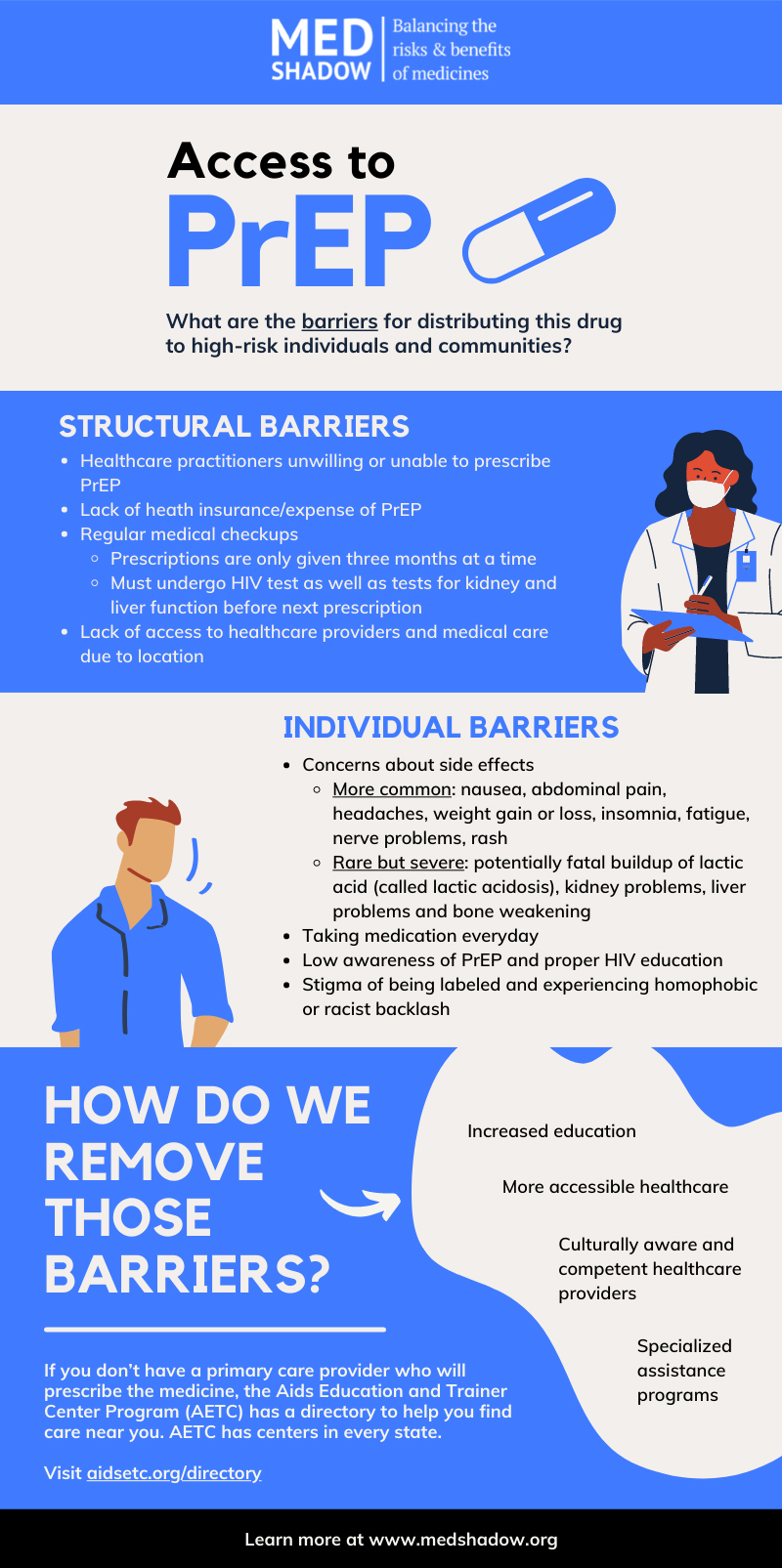Scott Frenzel had been treated at his local healthcare clinic in Nashville, Tennessee, for a sexually transmitted infection (STI) twice. Even though he is a prime candidate for pre-exposure prophylaxis (PrEP), a drug that can help prevent contracting HIV (human immunodeficiency virus), none of the healthcare providers at the clinic told him about the drug. Instead, he heard about it from “some older gay friends,” who suggested that he needed to be on PrEP.
Finding a doctor who will prescribe PrEP is sometimes difficult because there is a stigma attached to it, since HIV is often contracted through sex or recreational drug use. Several years ago, Frenzel found a doctor to write him a prescription for the drug. He has been taking it since August 2016. Luckily, the only side effect of PrEP he’s experienced is mild nausea. Like all patients prescribed the drug, Frenzel does have to be tested frequently to ensure that he has not contracted HIV and that his kidneys and liver are functioning properly, because PrEP can strain those organs.
Who Benefits From PrEP?
PrEP is for those at high risk of contracting HIV. That includes people who have:
- Multiple sexual partners
- HIV+ sexual partners
- Had recurring sexually transmitted infections
- And use recreational drugs
The Food and Drug Administration (FDA) has approved three drugs for use as PrEP. They are: Truvada (emtricitabine and tenofovir disoproxil fumarate), Descovy (emtricitabine and tenofovir alafenamide fumarate) and Apretude, an injection given once every two months. The FDA approved Truvada in 2012 for use by men and women who are at high risk of HIV. Descovy, on the other hand, which got FDA approval in 2019, is only for use by men. “The newer drug, Descovy, has only been looked at in men having sex with men or transgender men. So it’s not indicated for women who are at risk,” says Mesfin Fransua, MD, who treats HIV patients at the Morehouse School of Medicine. The latest drug, Apretude, was approved for both men and women at risk of contracting HIV.
Neither drug has been evaluated in pregnant women. So if you may become pregnant while taking the drug, it’s important to discuss the possible risks with your physician. Lastly, the drugs are not recommended for people with damaged kidneys or livers, as PrEP can exacerbate the condition.
How Does PrEP Work?
The two oral PrEP drugs are combinations of two nuclease reverse transcriptase inhibitors (NRTIs), drugs that prevent the HIV virus from making copies of itself when it enters your body.
Preventing replication thwarts an infection from taking hold, even if you come in contact with some of the virus. These drugs were initially used to treat HIV after an infection was established. Each drug contains the NRTI emtricitabine, but Truvada combines it with another NRTI called tenofovir disoproxil fumarate and Descovy combines emtricitabine with a different NRTI, tenofovir alafenamide fumarate. “These are the same medications we administer to HIV-infected patients,” says Fransua. But in that setting, they’re usually used in combination with other drugs.
Event-Driven PrEP Dosing
Typically, you’d take the two oral formulations daily, but one clinical trial showed that “event-driven” use can work as well. In this dosing strategy, you’d only take the pills when you’re planning to have sex, but it requires some advanced planning. In the trial, participants took two pills 2 to 24-hours before intercourse, and another pill 24 to 48 hours after the first. Authors pointed out that participants in the study took about four pills per week on average. It’s unclear if the regimen would still be effective if you use the pills less frequently. Be sure to discuss your dosing plans with your healthcare provider.
Risks and Side Effects of PrEP
A 2022 survey study found that side effects were the most important consideration for most patients consider PrEP. Even those concerned about cost said they’d be willing to pay $200 for PrEP without side effects, if the alternative was free PrEP with side effects.
Most of PrEP’s side effects are relatively mild and dissipate within a few months. Like many patients who are prescribed PrEP, Frenzel experienced nausea when he first started taking Truvada, so he shifted to taking the pill in the morning after eating a granola bar. That action helped mitigate the queasiness. After a few months, he was able to use the drug without eating. He eventually switched to Descovy, because he’d heard that it may be easier on his kidneys and liver. Fortunately, he didn’t experience nausea with Descovy. “Within the first couple of weeks, in most patients. the side effects wear off,” says Fransua.
According to the clinical trials, the injectable drug, Apretude, was more effective than Truvada at preventing HIV. However, patients also reported more side effects with the injections such as fever, fatigue, pain, headaches and rashes, than they did with the pill.
All three drugs do come with serious risks. One is that if the drugs are used on a patient who has recently contracted HIV, but not yet tested positive, the person’s infection can develop resistance to HIV drugs. That’s why a negative test is required to initiate treatment and then every three months throughout use. “A person must have a negative HIV test to even consider PrEP use,” says Fransua. Additionally, the treatments can also worsen hepatitis B in some patients.
The most serious side effects of PrEP medications are a potentially fatal buildup of lactic acid (called lactic acidosis), kidney and liver problems and bone weakening. Kidney problems usually resolve if you stop taking the medication. Generally, doctors will not prescribe the drug to patients who already have kidney failure.
Weight gain is more common with the injectable Apretude than it is with the oral forms of PrEP.
Common side effects include:
- Nausea
- Abdominal pain
- Headaches
- Weight gain or loss
- Insomnia
- Fatigue
- Nerve problems
- Skin rash
How to Counter Side Effects
If you experience nausea, taking your medicine with food may help. If it causes insomnia, a variety of lifestyle changes and supplements, ranging from guided meditations to taking melatonin, may induce sleep.
Nerve problems can range from mild tingling in the hands and feet to severe pain. If the conditions are minimal, massages, soaking feet in cool water, and avoiding tight footwear and standing for long periods. According to the National Institutes of Health (NIH), weight-bearing exercise such as lifting weights can help strengthen thinning bones, as can taking supplements like vitamin D and calcium.
Descovy has been associated with some weight gain, says Fransua. “It’s not a huge problem, but somebody who already has obesity, may be better off taking Truvada than Descovy,” assuming that that person is a man.
Lactic acidosis can be life-threatening. If you experience an upset stomach and vomiting, extreme exhaustion or unusual shortness of breath, see a doctor right away.
Be sure to discuss any medications or supplements you use with your physician, as some can interfere with the efficacy of PrEP or cause additional stress on the kidneys and liver.
PrEP in Pregnancy
No trials for PrEP purposely enrolled pregnant patients, but since PrEP does not prevent pregnancy, some trial participants did become pregnant over the course of the studies. Researchers combined data about pregnant individuals from separate trials of the two oral prep medications and found that the drugs did not increase the rate of spontaneous abortion, preterm births, congenital abnormalities or infant mortality. In the studies, the women stopped taking the drugs when they found out they were pregnant.
How to Get a Prescription for PrEP
Fransua says PrEP is very underutilized in the community at-risk for HIV. Some healthcare practitioners are unfamiliar with the drug or uncomfortable prescribing it. Such scenarios leave patients to find out about it on their own and then, perhaps, struggle with stigma when looking for a doctor who will prescribe it to them.

“I navigated finding a provider in the South as a broke college student. I have been shamed by public health-center workers who told me I’d get HIV if I continued my risky behavior (they did not understand what PrEP was),” says Frenzel. “My last provider in Nashville said that people would drive over two hours for their three-month PrEP appointment, because affordable, affirming providers were few and far between.”
Another challenge with PrEP is that prescriptions are only given three months at a time. Before a prescription runs out, patients need to undergo an HIV test as well as those for kidney and liver function before receiving the next three-month supply. This can be difficult for those with limited access to transportation or healthcare clinics.
If you don’t have a primary care provider who will prescribe the medicine, the AIDS Education and Trainer Center Program (AETC) publishes a directory to help find nearby care. AETC operates centers in every state.
“Sometimes insurance won’t allow you to see a specialist,” says Fransua. “In that case, there are primary care providers who are comfortable prescribing PrEP, [including] nurse practitioners and other providers. If [patients] go to AETC, they will find a list of providers,” who know about PrEP.






